When it comes to training your Poodle, the balance between intelligence and energy is crucial. Starting off on the right foot can make all the difference in developing a well-behaved companion. But how do you lay this foundation effectively? Let's explore the key strategies that will set you and your Poodle up for success in obedience training.
Key Takeaways
- Establish a strong foundation with basic commands like sit, stay, come, and heel.
- Begin training early at 6-8 weeks to develop social skills and confidence.
- Consistency in training methods reinforces desired behaviors and strengthens the bond.
- Use positive reinforcement techniques like treats, praise, and clicker training for effective communication.
Poodle Obedience Training Basics
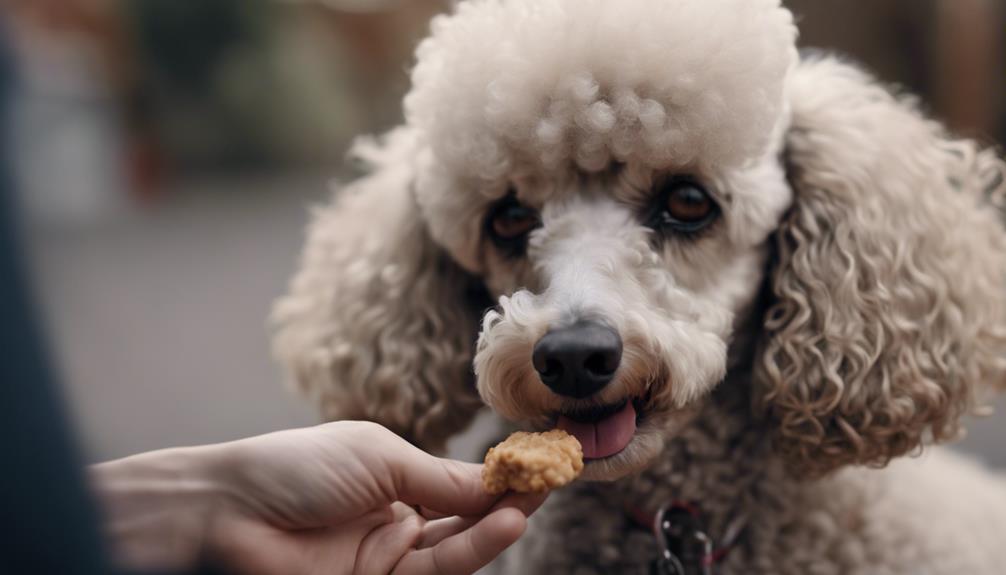
When beginning poodle obedience training, it is crucial to establish a strong foundation of basic commands early on, typically starting around 6-8 weeks of age. Poodles are intelligent and eager to please, making them receptive to learning commands like sit, stay, come, down, and heel. Using positive reinforcement, such as treats, praise, or toys, is essential to encourage good behavior during training sessions. Keep the training sessions short, around 10-15 minutes, to maintain your poodle's focus and prevent frustration. Consistency is key in poodle obedience training. By using methods like Capture and Shape, Lure to Obedience, and Hand Signals consistently, you will help your poodle understand what is expected of them. Remember, patience and repetition are your allies in teaching your poodle basic obedience commands. By laying this groundwork early on, you are setting the stage for a well-behaved and responsive companion.
Training Techniques for Poodles
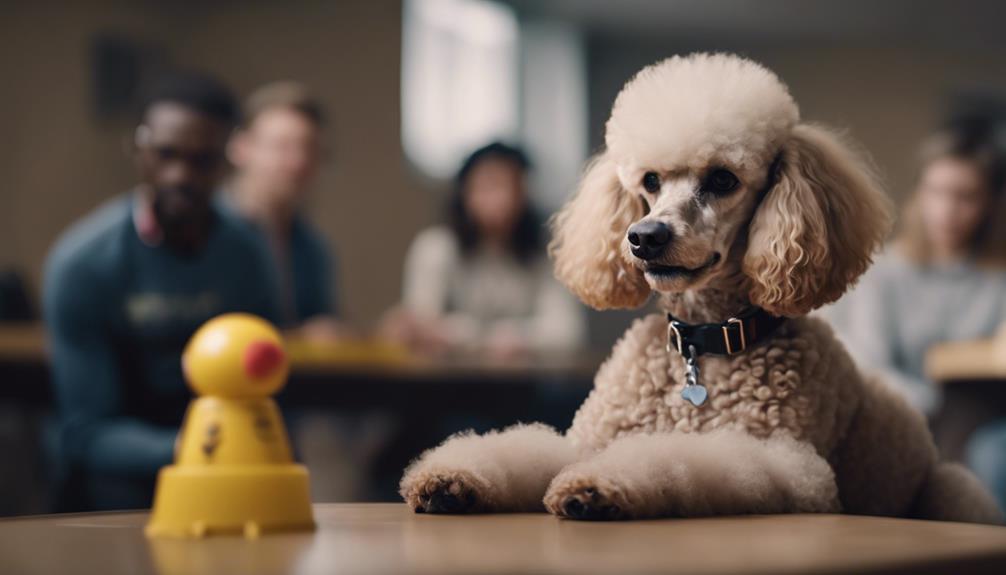
To effectively train your Poodle, utilize a variety of techniques such as Capture and Shape, Lure to Obedience, and Hand Signals for optimal results. Positive reinforcement is crucial in teaching your Poodle obedience. Capture and Shape involves rewarding your Poodle for behaviors you want to encourage, gradually shaping them towards the desired response. Lure to Obedience uses treats to guide your Poodle into the desired position or action, reinforcing good behavior. Hand Signals can be paired with verbal cues to help your Poodle understand commands better. Additionally, integrating methods like the Leave It technique, Crate time with a stuffed chew toy, Teaching Out command, and Teaching Place command can further enhance your Poodle's training experience. Consistency in applying these techniques and providing positive reinforcement is key to successful obedience training. Remember to tailor your training methods to address any specific behavioral issues your Poodle may have, ensuring a tailored and effective training approach.
Starting Obedience Training Early
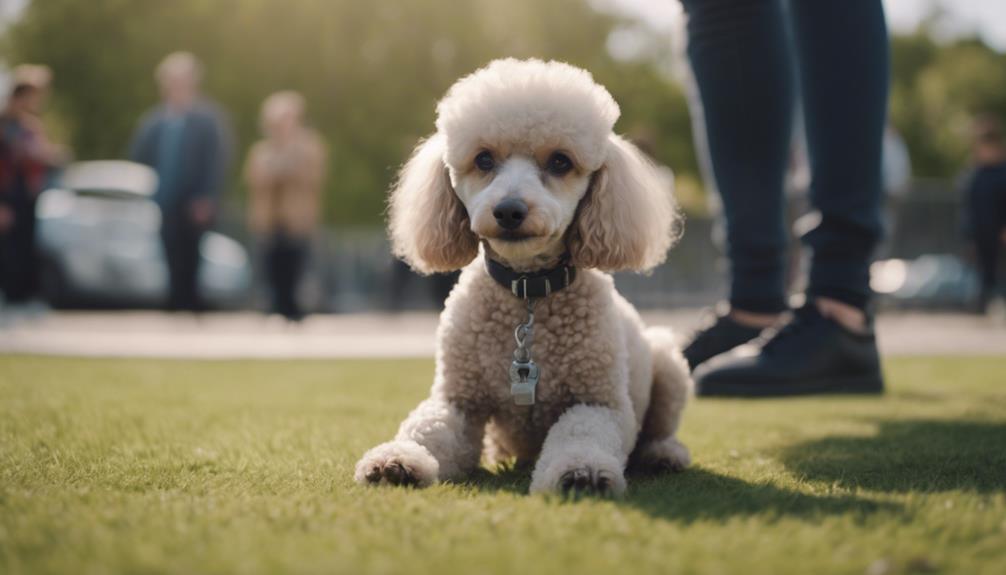
Establishing good habits from a young age is crucial when starting obedience training early for Poodles. When training your Poodle early, keep in mind the following:
- Commence Training at the Right Time: Begin obedience training for your Poodle as early as 6-8 weeks old. This early start will help in laying a strong foundation for good behavior and responsiveness.
- Teach Basic Commands: Use early training sessions to introduce basic commands like sit, stay, come, and heel. Poodles are intelligent and can quickly grasp these commands when taught consistently and positively.
- Focus on Socialization: Early socialization is key to helping your Poodle adapt well to various environments and situations. Expose your Poodle to different people, pets, and places to develop their social skills and confidence.
Importance of Consistent Training
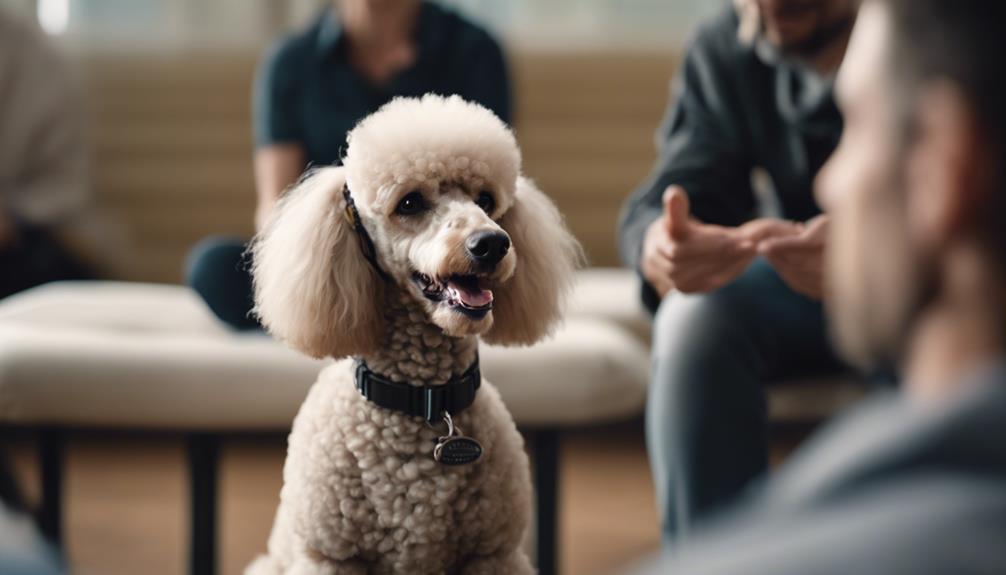
For successful obedience training with your Poodle, maintaining consistency in your approach is key. Training consistency is essential as it helps establish clear boundaries and expectations for your Poodle. By setting a consistent routine and sticking to it, you reinforce desired behaviors and prevent confusion in your pet. Consistency in training also plays a crucial role in building a strong bond between you and your Poodle. When your Poodle knows what to expect from you and understands the rules you've set, they feel more secure and are more likely to respond positively to your commands. Inconsistencies in training can lead to mixed signals, hindering your progress in teaching your Poodle obedience. Therefore, by staying consistent in your training methods, you are laying a solid foundation for good behavior and obedience in your Poodle, which ultimately strengthens the bond between you and your furry companion.
Positive Reinforcement Methods

When training your Poodle, remember that positive reinforcement methods are key. By using treats, clicker training, and praise, you can encourage good behavior effectively. These techniques help build a strong bond between you and your Poodle, making training sessions enjoyable and productive.
Treat-Based Training
Utilizing high-value treats for positive reinforcement, you can effectively encourage desired behaviors in Poodles during treat-based training. Here are some essential tips for successful treat-based training:
- Choose the Right Treats: Opt for treats that your Poodle finds irresistible to maintain their interest and motivation.
- Timing is Key: Give the treat immediately after the desired behavior occurs to reinforce the connection between the action and the reward.
- Consistency Matters: Be consistent in treating and praising good behavior to help your Poodle understand what is expected of them.
Clicker Training Technique
Start incorporating the clicker training technique to enhance positive reinforcement methods for your Poodle's obedience training. Clicker training is a powerful tool that utilizes positive reinforcement to communicate effectively with your Poodle. By making a clicking sound to mark desired behaviors, you can provide immediate feedback, helping your Poodle understand exactly what they did right. This method strengthens the bond between you and your furry companion while making the learning process more efficient and enjoyable. Consistency in timing and pairing the click with a reward is crucial for successful clicker training sessions. Check out the table below for a quick overview of the benefits of clicker training for Poodles:
| Benefits of Clicker Training for Poodles |
|---|
| Enhances communication |
| Provides quick feedback |
| Makes learning efficient and enjoyable |
| Strengthens the bond between you and your Poodle |
| Requires consistency in timing and rewards |
Praise and Reward
To effectively reinforce positive behavior in your Poodle during obedience training, utilize a combination of praise and rewards. Positive reinforcement methods like praise and rewards are highly effective in motivating Poodles. Here are some key points to consider:
- Poodles Respond Well: Poodles respond positively to praise and rewards, leading to faster learning and better retention of commands.
- Variety of Rewards: Incorporating treats, verbal praise, and physical affection as rewards can create a positive association with obeying commands in Poodles.
- Building a Strong Bond: Consistent use of positive reinforcement helps build a strong bond between you and your Poodle, enhancing the training experience.
Short and Effective Training Sessions

To ensure successful training sessions with your Poodle, remember that timing is crucial. Keep sessions short and focused, aiming for around 10-15 minutes at a time. By maintaining consistency and using positive reinforcement techniques, you can optimize your Poodle's learning experience.
Timing Is Crucial
Keeping training sessions short and focused is essential for effective obedience training with Poodles. Here are some key points to remember:
- Duration: Aim for 10-15 minute sessions to maintain focus and prevent boredom.
- Frequency: Opt for 2-3 short sessions a day over long, infrequent ones for better results.
- Attention Span: Poodles have short attention spans, so concise sessions help in retaining information and reinforcing commands.
Consistency Is Key
For effective obedience training with Poodles, maintaining consistency through short and focused sessions is key. Your Poodle's ability to learn and retain information greatly depends on regular training sessions. Short bursts of 10-15 minutes several times a day are ideal to keep your pup engaged and prevent boredom. By sticking to a consistent schedule, you help maintain your puppy's attention span and avoid overwhelming them. Remember, it's not about the length of the session but the quality of the training. Regular, brief sessions with positive reinforcement lead to better results than sporadic, lengthy ones. Stay committed to these short training sessions, and you'll see progress in your Poodle's obedience skills.
Use Positive Reinforcement
When training your Poodle, remember that using positive reinforcement, like praise and treats, is essential for motivating your furry companion. To make the most of your training sessions, keep them short and effective. Here's how you can do it:
- Short Training Sessions: Aim for 10-15 minute sessions to maintain your Poodle's focus and prevent boredom.
- Motivation: Regular, short training sessions (2-3 times a day) are more effective than long, infrequent ones, keeping your Poodle engaged and eager to learn.
- Consistency: Remember, quality over quantity is key. Ensure each training session is engaging and productive, using positive reinforcement consistently to reinforce desired behaviors and strengthen the bond between you and your Poodle.
Clear Commands for Poodles

To effectively communicate with Poodles during obedience training, utilize simple, one-word commands such as 'sit,' 'stay,' and 'come.' Clear commands are essential for Poodles to understand what you expect from them. Consistency in using these commands will help your Poodle learn and respond appropriately. Long or complex commands can confuse your furry friend, so stick to short, precise instructions. Incorporating hand signals along with verbal cues can further reinforce the commands and improve your Poodle's responsiveness. Remember, patience is key when teaching your Poodle new commands. It may take time for them to fully grasp what is expected, so be patient and repeat the commands consistently. By using clear, one-word commands, maintaining consistency, incorporating hand signals, and practicing patience, you can effectively communicate and train your Poodle with success.
Patience in Training Poodles
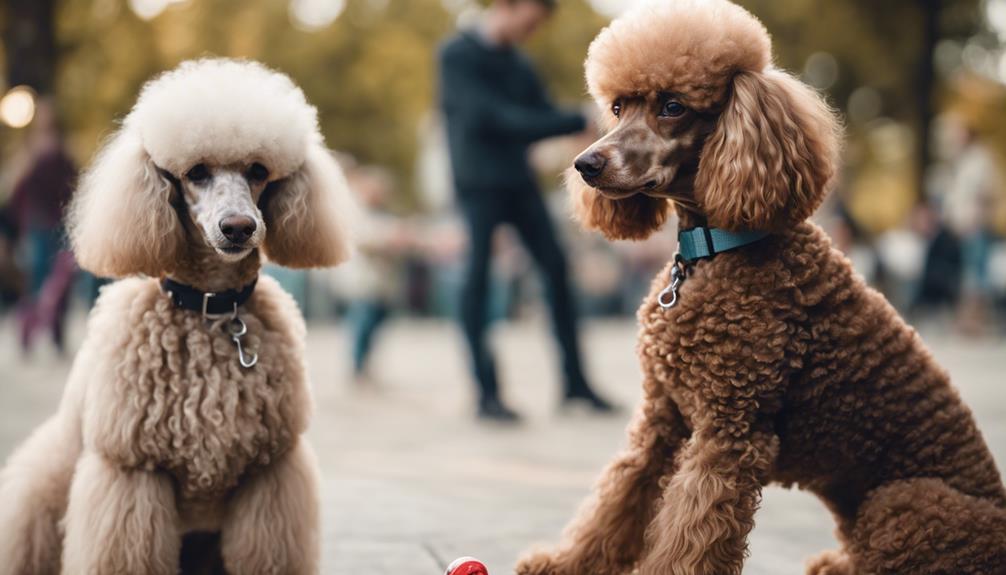
Hey, training your Poodle requires patience. They learn best with calm, consistent guidance. Remember, take your time, and your Poodle will progress steadily.
Importance of Patience
Exercising patience in training your Poodle is fundamental for fostering a positive learning environment and strengthening your bond with your furry companion. When working with your Poodle, remember:
- Poodles are Sensitive: They pick up on your emotions and energy, so staying patient helps them feel secure and open to learning.
- Avoid Rushing: Showing frustration or impatience can hinder the training progress, making it essential to remain calm and composed.
- Use Positive Reinforcement: Poodles respond well to positive reinforcement, and patience enhances their obedience and accelerates the learning process. By understanding and respecting your Poodle's pace, you can tailor training methods to suit their individual needs, ultimately building trust and a strong bond through consistent patience.
Consistent Positive Reinforcement
Being consistent in your positive reinforcement techniques is crucial for effectively training your Poodle with patience and achieving desired behaviors. Poodles, known for their intelligence, respond well to positive reinforcement methods like treats and praise. Consistency in your training approach helps them understand what is expected, leading to successful obedience training. Patience is key when working with Poodles as they learn at their own pace. By maintaining a positive learning environment through consistent positive reinforcement, you are setting your Poodle up for success. Remember, every interaction is an opportunity for training, so stay patient and consistent in your approach. Below is a table to help you understand the importance of patience in obedience training for Poodles:
| Patience | Positive Reinforcement | Consistency |
|---|---|---|
| Helps Poodles learn effectively | Encourages desired behaviors | Sets clear expectations |
| Allows for individual learning pace | Creates a positive environment | Builds trust and understanding |
| Key for successful obedience training | Motivates Poodles to follow commands | Reinforces learning |
Understanding Poodle Behavior
Understanding Poodle behavior is crucial for effectively training them with patience and achieving desired obedience results. Poodles possess high intelligence and energy levels, making them attentive learners but also prone to getting easily bored. To train them successfully, you should:
- Utilize Positive Reinforcement: Poodles respond well to rewards and praise, reinforcing good behavior and encouraging learning.
- Exercise Patience: Given their sometimes stubborn nature, staying patient during training sessions is key to overcoming challenges and building a strong bond.
- Maintain Consistency: Establishing a routine with clear commands and consistent expectations helps Poodles understand what is expected of them, leading to better obedience outcomes. Remember, each Poodle is unique, so adapt your training approach to suit their individual learning pace and temperament.
Socialization Tips for Poodles

To ensure your Poodle grows up to be well-adjusted and friendly, start socializing them early, ideally between 3-12 weeks of age, exposing them to various environments, people, animals, and sounds. Socialization at this early age is crucial as it helps prevent behavioral issues such as fearfulness, aggression, and shyness. Positive experiences during socialization lay the foundation for a confident and sociable adult Poodle. Consider enrolling your pup in puppy socialization classes to provide structured interactions with other dogs and people, fostering positive social behavior. Here are some practical socialization tips for your Poodle:
| Socialization Tips for Poodles | Description |
|---|---|
| Early Start | Begin socializing your Poodle between 3-12 weeks. |
| Exposure | Introduce your Poodle to various environments, people, animals, and sounds. |
| Positive Reinforcement | Reward good behavior during socialization experiences. |
| Puppy Classes | Consider enrolling your Poodle in puppy socialization classes. |
| Consistency | Be consistent in your socialization efforts to reinforce positive behaviors. |
Addressing Unwanted Behaviors
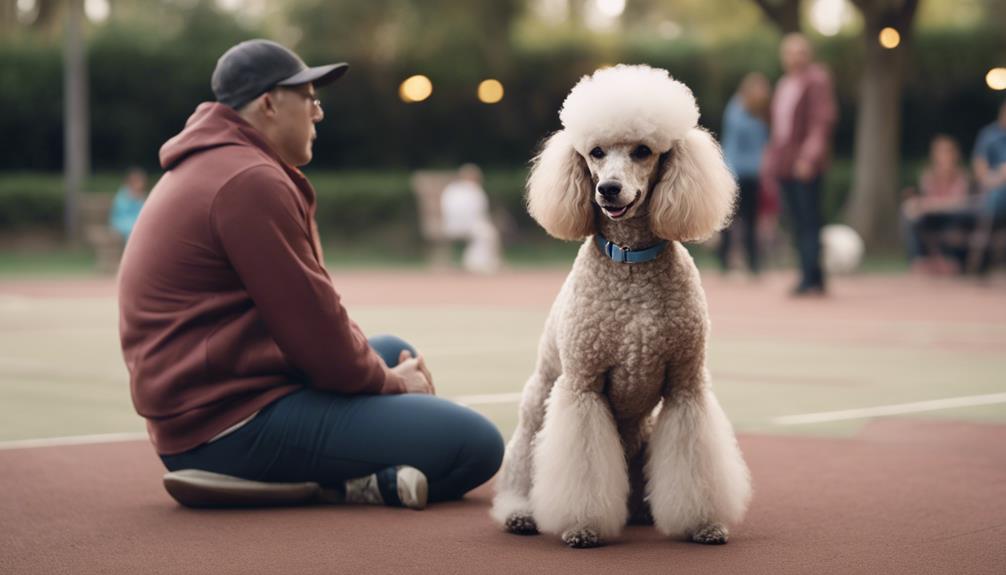
To effectively address unwanted behaviors in your Poodle, pinpointing the underlying cause is crucial for successful behavior modification. Here are some steps to help you tackle these behaviors effectively:
- Identify the Root Cause: Whether it's excessive barking, jumping, or any other unwanted behavior, understanding why your Poodle is displaying these actions is the first step towards addressing them.
- Implement Positive Reinforcement: Utilize training techniques that focus on rewarding good behavior rather than punishing unwanted behavior. Positive reinforcement can help encourage the desired actions from your Poodle.
- Consistency is Key: Maintain a consistent approach to training and addressing unwanted behaviors. Poodles thrive on routine, so consistent training methods will help them understand what is expected of them.
Realistic Training Expectations
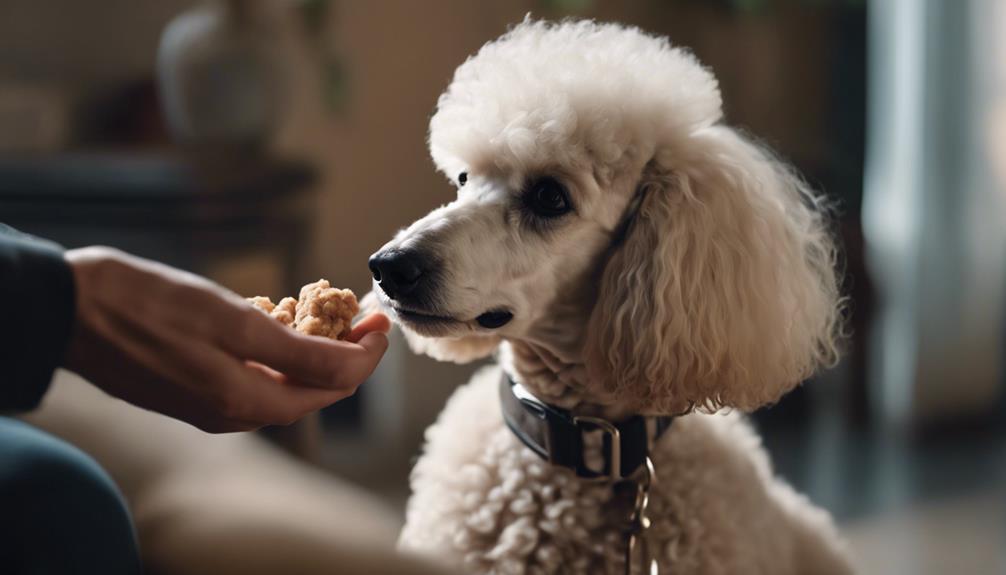
For successful obedience training with your Poodle, it's important to set realistic expectations that align with your furry companion's individual learning pace. Each Poodle is unique, with varying abilities and personalities, so progress may differ from dog to dog. Embrace this individuality and tailor your training approach accordingly. By understanding your Poodle's pace, you can set achievable goals that lead to success.
Positive reinforcement is key in fostering a positive learning environment. Celebrate even the smallest milestones during training sessions. This not only boosts your Poodle's confidence but also maintains their motivation to learn. Remember, patience is crucial. Avoid rushing the training process or expecting instant results. Building a trusting relationship takes time and consistency.
Focus on progress rather than perfection. Embrace the journey of growth and improvement with your Poodle. By setting realistic goals, celebrating achievements, and using positive reinforcement, you pave the way for successful obedience training that strengthens the bond between you and your furry friend.
Avoiding Punishment in Training
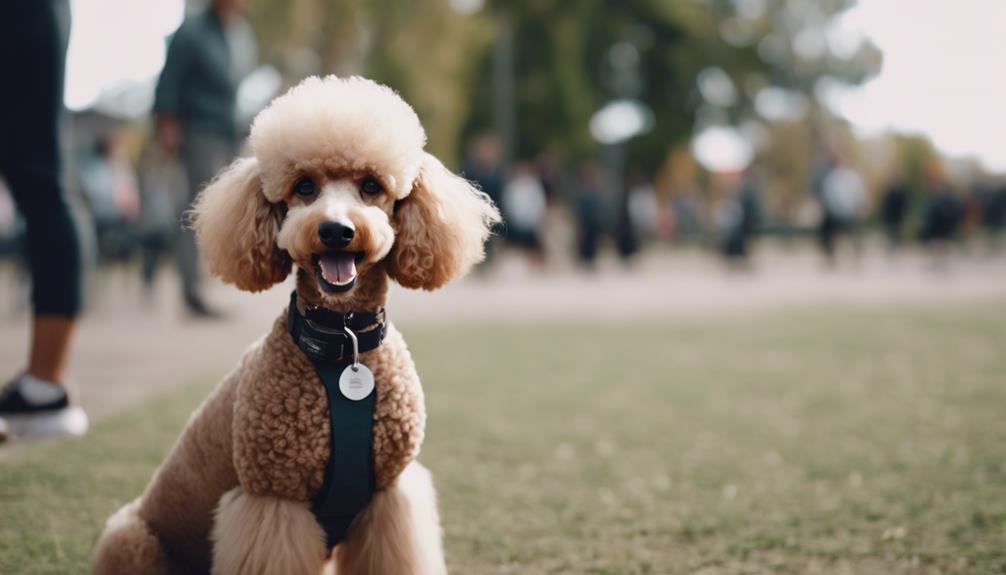
Punishment-based training methods should be avoided when training your Poodle to prevent negative behavioral outcomes and maintain a positive learning environment. Instead, focus on positive reinforcement techniques to shape your Poodle's behavior effectively. Here's why you should steer clear of punishment in training:
- Promotes positive learning: Positive reinforcement, such as treats and praise, encourages your Poodle to repeat desired behaviors, creating a conducive learning environment.
- Preserves the bond: Punishing a Poodle can lead to fear and anxiety, damaging the trust between you and your furry companion. Positive reinforcement fosters a strong bond based on trust and mutual respect.
- Enhances training outcomes: Poodles respond better to rewards and positive feedback, making training sessions more enjoyable and effective. By avoiding punishment, you set the stage for successful training experiences and a harmonious relationship with your Poodle.
Teaching Essential Commands

When teaching essential commands to your Poodle, start with simple instructions like sit and gradually progress to more advanced cues for a strong obedience training foundation. Begin by using a clear and firm voice to give commands such as sit, stay, come, down, and heel. Utilize positive reinforcement, like treats or praise, to reward your Poodle for following commands correctly. Consistent practice is essential for your Poodle to understand and respond to these basic cues effectively. Remember, patience is key during training sessions, as each Poodle learns at its own pace.
Teaching your Poodle these essential commands not only fosters good behavior but also strengthens the bond between you and your furry companion. By incorporating these basic obedience cues into your daily routine, you are setting the groundwork for more advanced training in the future. Celebrate small victories and progress, and always make training sessions a positive and enjoyable experience for both you and your Poodle.
Frequently Asked Questions
When Should You Start Training a Poodle?
You should start training your poodle as early as 7-8 weeks old. This early stage is crucial for puppy readiness, developmental stages, socialization benefits, positive reinforcement, consistency, and patience. Establishing routines and basic commands early sets a solid foundation for their growth.
What Is Basic Training for a Poodle?
When training your Poodle, focus on positive reinforcement and consistency. Clicker training and leash manners are essential. Socialize your pup and prioritize housebreaking. Teach basic commands for mental stimulation and reward with treats and playtime.
How Do You Discipline a Standard Poodle?
When disciplining a Standard Poodle, focus on establishing boundaries with positive reinforcement. Be consistent in correction, building trust through redirection of behavior. Avoid harsh methods for effective training. Remember, patience and consistency are key in guiding your Poodle.
What Is the Best Way to Train a Standard Poodle?
To train your Standard Poodle best, focus on positive reinforcement, utilize clicker training for precision, employ effective socialization techniques, master leash manners, and prioritize recall training. Consistency and patience are key for successful obedience training.
Conclusion
Now that you've learned the basics of obedience training for your Poodle, remember that training is like planting a seed. With patience and consistency, you'll see your efforts bloom into a well-behaved and happy companion. Just like a garden requires care and attention, so does your furry friend. Keep nurturing your training skills and watch as your Poodle grows into a well-trained and obedient member of your family. Happy training!
